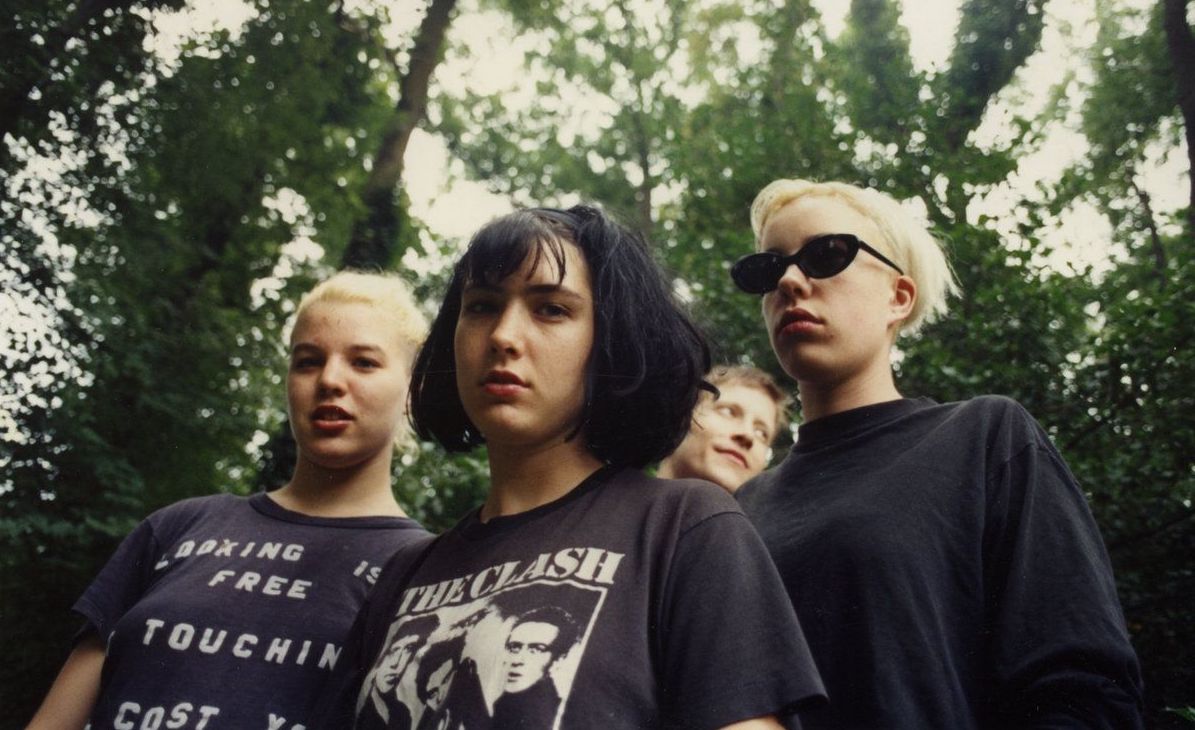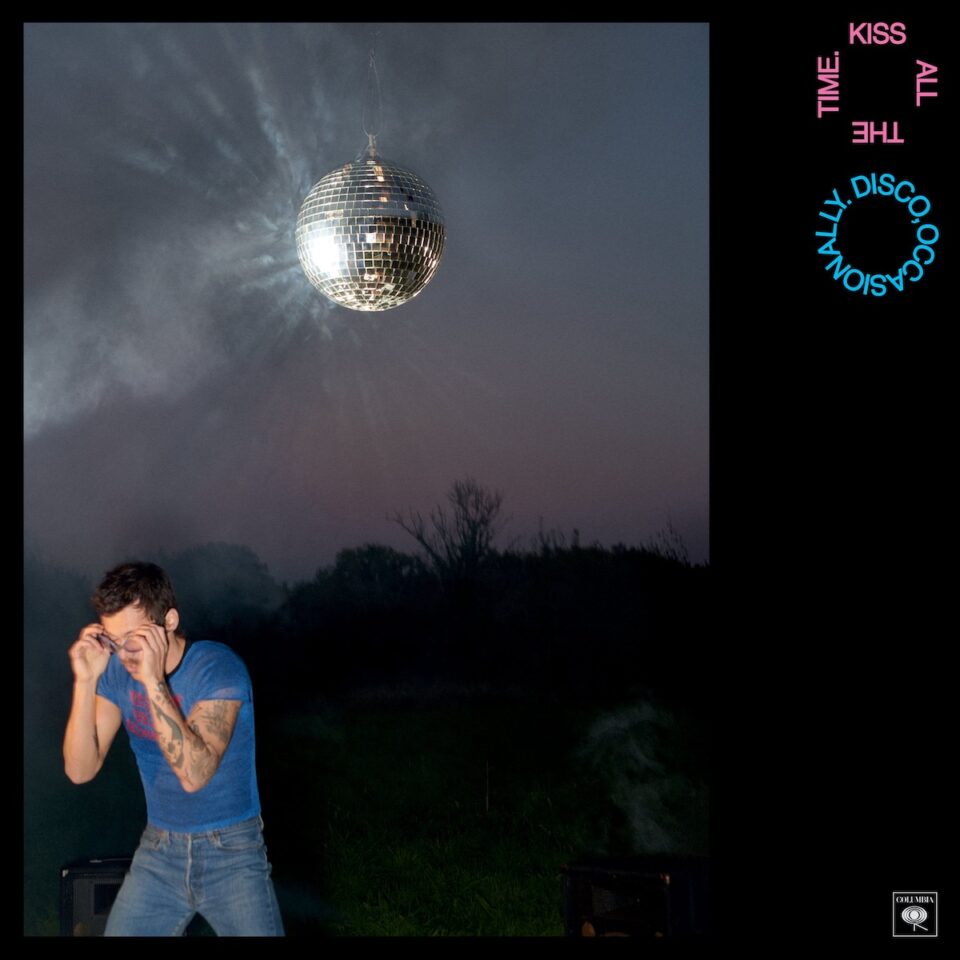In Florence’s Uffizi Gallery hangs Caravaggio’s painting of Medusa, the mythical Greek beauty raped by Poseidon, turned into a monster, and exiled as punishment. Caravaggio’s painting captures Medusa post–bloody decapitation by Perseus, still conscious with her mouth open in a horrific scream at her assailant; she’s the victim of repeated violence, yet we are supposed to be repulsed by her anger.
Medusa has long been a symbol of female rage—an insult or a compliment, depending on whom you ask. In today’s climate, I’ve thought often of Caravaggio’s evocative image, and of another enraged icon she reminds me of. In one of many archive clips featured in The Punk Singer, the 2013 documentary on Kathleen Hanna, the Bikini Kill frontwoman stands on stage in a black bra, the word “slut” scrawled across her stomach. Addressing a male heckler (“every show we played was like a war,” drummer Tobi Vail describes earlier in the same clip), her tone is as antagonistic as his. “I have a fucking right to be hostile,” she seethes, “and I’m not gonna sit around and be peace and love with somebody’s fucking boot on my neck.”
They’re not that different, Medusa and Hanna. Both have suffered at the hands of rape and patriarchal violence but refuse to be victims, defiantly owning their pain. And it is amidst the recent uprising of angry women that Bikini Kill’s proper debut album, Pussy Whipped, turns twenty-five. Now available on streaming platforms for the first time, revisiting it is a reminder of how little society has changed in all that time, and how relevant the band remains.
Formed in Olympia, Washington, in 1990 by Hanna and Vail, along with bassist Kathi Wilcox and guitarist Billy Karren, Bikini Kill carved out a niche feminist space in an aggressively masculine punk scene. Hanna had things she wanted to say, and followed the advice of her idol, feminist writer Kathy Acker—if she said something with a band behind her, people would actually listen. Bikini Kill’s music reflected the riot grrrl movement: ferocious, haphazard, and unrelenting. They didn’t care if what they were doing was attractive or even palatable. At live shows, they created femme-friendly environments and fought back against hecklers. In early slapdash recordings like Revolution Girl Style Now and Yeah Yeah Yeah Yeah, they insist that their fury be heard, no matter how imperfect it sounds. Despite their protests that riot grrrl was a decentralized movement, they quickly became known as its de facto leaders.
While Pussy Whipped is more polished than earlier DIY releases, it is far from pearlescent. Its twelve tracks cover twenty-five incendiary minutes, driven by droning buzzsaw guitars, propulsive basslines, belligerent drums, and rough vocals.
Bikini Kill knew silence was on par with complicity, and long before there was the support of a #MeToo community, their songs openly addressed rape culture, abuse, incest, and more taboo issues.
“I didn’t really have that many effects on my voice during most of our recording,” Hanna explained earlier this year. “I want women to hear my voice how it really is without making it sound all beautiful and whatever. I want them to hear someone who sounds pissed off.”
But to describe Bikini Kill’s sound as simply “pissed off” is to dismiss a range of other nuanced emotions. Hanna’s voice travels unapologetically from bored and bratty speak-singing to guttural wails on “Magnet,” and becomes agency-seeking and assertive on songs like “Sugar” and “Lil’ Red.” On “Alien She,” she boldly reclaims the insults “feminist, dyke, whore,” but not without vulnerability, questioning whether there can be gray space in a black and white world of traditional feminine norms. Alongside the indignancy there is also the anthemic ode to girl love, “Rebel Girl,” and the nostalgic, ballad-like “For Tammy Rae”—reminders that our anger needn’t override all other feelings or prevent us from allowing moments of light and tenderness to shine through.
Meanwhile, Vail’s “Tell Me So” and Wilcox’s “Speed Heart” are explosive sister meditations on the discomforting male gaze; Vail’s screams of “If you are gonna look at me / I am gonna get a prize” and Wilcox’s “What do you want from me?” fly out on their respective tracks with such intense furor that the words become unintelligible.
Bikini Kill knew silence was on par with complicity, and long before there was the support of a #MeToo community, their songs openly addressed rape culture, abuse, incest, and more taboo issues. They made girls feel safe, less alone.
“I was blown away by how saying it on stage—‘Hey, I’m sick of sexual harassment and I wrote this song about being harassed on the street’—would result in women coming up to me every night and saying that,” Hanna told The Guardian, reflecting on girls who would confide their own experiences to her after shows. “That’s what kept me going when dudes would yell, ‘Shut up shut up shut up.’”
The group knew how it felt to be overwhelmingly angry about the injustices in the world, and realized that sometimes there was no way to dress that rage up or poeticize it. Sometimes the only way it could be voiced was in language as blunt and vulgar as the violence done to women—so they screamed. They screamed for many of the same reasons we want to scream now: because they, too, watched a woman’s credible allegations against a powerful Supreme Court justice be ignored and mocked, because of the assaults on themselves and their friends, because even their daily lives felt prickly and dangerous—and all the while, men were proclaiming they were the ones who should be scared.
By the time Pussy Whipped was released in 1993, riot grrrl was already in its denouement. The year saw debut releases from fellow riot grrrl bands Babes in Toyland and Bratmobile, the number of riot grrrl zines (essential to the formation and growth of both the band and third wave feminism) were booming, and Pussy Whipped sold 75,000 copies—a feat for an indie release at the time—but the genre was crumbling internally. It garnered enormous amounts of press attention, but media often either misrepresented riot grrrls or dismissed them as “vehemently militant,” unshaven, furious man-haters. The band distanced themselves from riot grrrl as the movement self-destructed, and “riot grrrl” became a commercialized trend and catchall genre for any wrathful alt-rocker with a vagina.
Despite critical rejection and constant violence from audiences, Bikini Kill persisted in creating space for women in the punk scene. Their influence shaped the direction in which feminist punk would move for years to come, strains of both their musical aesthetic and political ideology echoed in bands like Sleater-Kinney, Pussy Riot, and G.L.O.S.S.
We still need Bikini Kill in 2018. That they haven’t made new music since splitting in 1997 doesn’t really matter. Their entire back catalog, Pussy Whipped included, is just as important today as it was twenty-five years ago, only now it’s accessible enough for any pissed-off girl to find and scream along to, to hear the sound and power of her own voice when it feels like everything else is too loud. FL







